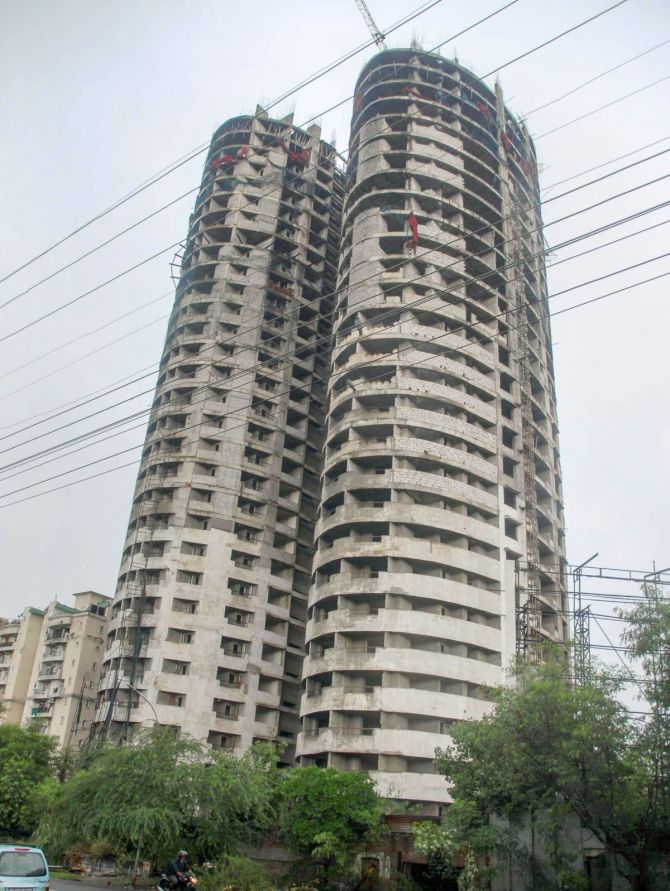As the demolition date of Supertech twin towers in Noida, Uttar Pradesh, inches closer, the company entrusted with the tricky task is putting the finishing touches to its preparations.

The 40-storey towers, found guilty of violating building norms, are to be brought down by implosion by Edifice Engineering by August 28, according to a deadline set by the Supreme Court.
Uttkarsh Mehta, partner at the firm, says the method of demolition — either manual, through machines, or implosion — is determined keeping in mind the condition of the site and the structure’s proximity to other buildings, besides other factors.
“In the case of the twin towers, which are approximately 103 metres high, a manual demolition would have taken ages, so we chose implosion.”
Every such case comes with its own set of challenges, he says.
“In the case of the twin towers, we had two big challenges — the proximity of one of the towers to a residential building, and a gas pipeline running under one tower,” Mehta elaborates.
To ensure the buildings come down at once, folding in like a house of cards, the firm has collaborated with South Africa-based Jet Demolitions to get an idea of the sequencing and designs to ensure the structures fall away from their surrounding buildings and the pipeline.
The basic principle of implosion is to break the critical support of the structure by using explosives, says Anand Sharma, director, Exiqude, a demolition firm based in Jaipur.
“We plant explosives at the critical support points.
"The idea is that when the blast happens the concrete is removed, and because steel alone cannot withstand the load of the structure, it starts collapsing,” he explains.
Sharma has carried out several demolitions during his career — many of which were done through implosions, including cooling towers less than 100 metres in height and chimneys.
In his last project in May, he had to demolish a water tank situated in an Ultratech Cement housing colony in Jafrabad, Gujarat.
With residential quarters 20-25 metres away and a hospital barely seven metres away, it was critical to contain not just the debris but also sound.
“We try to avoid using detonating fuse, apart from certain chemicals in the explosive, to contain the sound,” says Sharma.
Apart from sound, flyaway debris is another hazard that is taken into account while preparing for demolition.
The risk is usually mitigated through protective layers around the structure and evacuation of people from nearby areas.
In the case of the Supertech towers, Edifice will be using several layers of protection.
“Each and every column that will be blasted is being covered in four layers of wire mesh and four layers of geotextile cloth — a special cloth that is elastic in nature and allows the debris to be contained right at the source,” explains Mehta.
Apart from that, each floor will be “closed” by perimeter curtains — a geotextile cloth of different thickness — to contain the debris that escapes the initial layers of protection.
A fourth layer of security will be added by way of covering surrounding buildings with geotextile cloth.
Additionally, to ensure that vibrations from the blast and the fall don’t ripple across the surrounding structures, impact cushions are being created in the basement of the towers and trenches are being dug around to arrest them.
“The design of the blast will ensure that there is no instant impact on the ground. We call it a waterfall implosion,” Mehta explains.
“It will not come down in one go, but like a wave — from the starting point to the last point of the building, although that won’t be visible to a layman.
"The entire process will take just 7-8 seconds with both towers coming down simultaneously.”
Meanwhile, residents from surrounding buildings will be evacuated for a few hours.
“We have created a radius of 250 metres, where no living being will be allowed to stay for half the day,” Mehta adds.
Before the Supertech project, Edifice Engineering has led several demolitions in the country.
One that stands out is the Maradu flats demolition in Kochi, Kerala, in January 2020.
Edifice Engineering, along with Jet Demolition, handled the demolition of three of the four buildings that violated the coastal regulation zone norms.
These buildings were almost 65 metres in height.
There is no cut-copy-paste method when it comes to demolitions. The design of the fall depends on a variety of things — ranging from the structure’s height and make to what surrounds it.
“In Kochi, one of the challenges we faced were the surrounding resorts, buildings and waterbodies.
"We were told that not a single piece of debris should land in the water bodies,” Mehta recalls, adding, “Implosions are the best technique when working in a confined space and we did an immaculate job with the building coming down exactly how we had envisaged it.
"The same layers of protection were used and the nearby water bodies remained untouched.”
Earlier this year, the firm had sought an extension from the apex court for the Supertech project.
“We carried out a test blast in April to be doubly sure about the quality of the buildings, the construction, how much displacement of concrete happens with a certain quantity of explosives.
"There are a lot of shear walls in the structure, so we inferred we should go with more floors and asked for the extension,” he explains.
The firm has been entrusted with the responsibility of disposing of the debris — almost 30,000 tonnes in this case.
“We are in discussion with the authorities to figure out the best way to scientifically dispose of it.”
The debris in Kochi was dumped in a landfill that the Ernakulum municipality allotted to the firm. As the deadline nears for the Supertech project, is there any nervousness? “We are ready for all challenges,” says Mehta.









